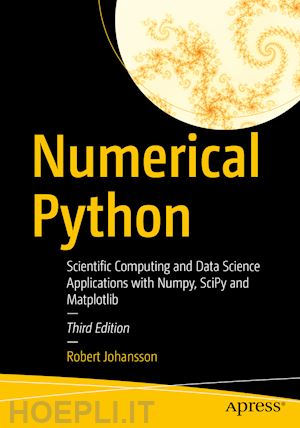

Questo prodotto usufruisce delle SPEDIZIONI GRATIS
selezionando l'opzione Corriere Veloce in fase di ordine.
Pagabile anche con Carta della cultura giovani e del merito, 18App Bonus Cultura e Carta del Docente
Learn how to leverage the scientific computing and data analysis capabilities of Python, its standard library, and popular open-source numerical Python packages like NumPy, SymPy, SciPy, matplotlib, and more. This book demonstrates how to work with mathematical modeling and solve problems with numerical, symbolic, and visualization techniques. It explores applications in science, engineering, data analytics, and more.
Numerical Python, Third Edition, presents many case study examples of applications in fundamental scientific computing disciplines, as well as in data science and statistics. This fully revised edition, updated for each library's latest version, demonstrates Python's power for rapid development and exploratory computing due to its simple and high-level syntax and many powerful libraries and tools for computation and data analysis.
After reading this book, readers will be familiar with many computing techniques, including array-based and symbolic computing, visualization and numerical file I/O, equation solving, optimization, interpolation and integration, and domain-specific computational problems, such as differential equation solving, data analysis, statistical modeling, and machine learning.
What You'll Learn
Who This Book Is For
Developers who want to understand how to use Python and its ecosystem of libraries for scientific computing and data analysis.
1. Introduction to Computing with Python.- 2. Vectors, Matrices and Multidimensional Arrays.- 3. Symbolic Computing.- 4. Plotting and Visualization.- 5. Equation Solving.- 6. Optimization.- 7. Interpolation.- 8. Integration.- 9. Ordinary Differential Equations.- 10. Sparse Matrices and Graphs.- 11. Partial Differential Equations.- 12. Data Processing and Analysis.- 13. Statistics.- 14. Statistical Modeling.- 15. Machine Learning.- 16. Bayesian Statistics.- 17. Signal and Image Processing.- 18. Data Input and Output.- 19. Code Optimization.- Appendix.
Robert Johansson is an experienced Python programmer and computational scientist with a Ph.D. in Theoretical Physics from Chalmers University of Technology, Sweden. He has worked with scientific computing in academia and industry for over 15 years and participated in open source and proprietary research and development projects. His open-source contributions include work on QuTiP, a popular Python framework for simulating the dynamics of quantum systems, and he has also contributed to several other popular Python libraries in the scientific computing landscape. Robert is passionate about scientific computing and software development, teaching and communicating best practices for combining these fields with optimal outcomes: novel, reproducible, extensible, and impactful computational results.











Il sito utilizza cookie ed altri strumenti di tracciamento che raccolgono informazioni dal dispositivo dell’utente. Oltre ai cookie tecnici ed analitici aggregati, strettamente necessari per il funzionamento di questo sito web, previo consenso dell’utente possono essere installati cookie di profilazione e marketing e cookie dei social media. Cliccando su “Accetto tutti i cookie” saranno attivate tutte le categorie di cookie. Per accettare solo deterninate categorie di cookie, cliccare invece su “Impostazioni cookie”. Chiudendo il banner o continuando a navigare saranno installati solo cookie tecnici. Per maggiori dettagli, consultare la Cookie Policy.